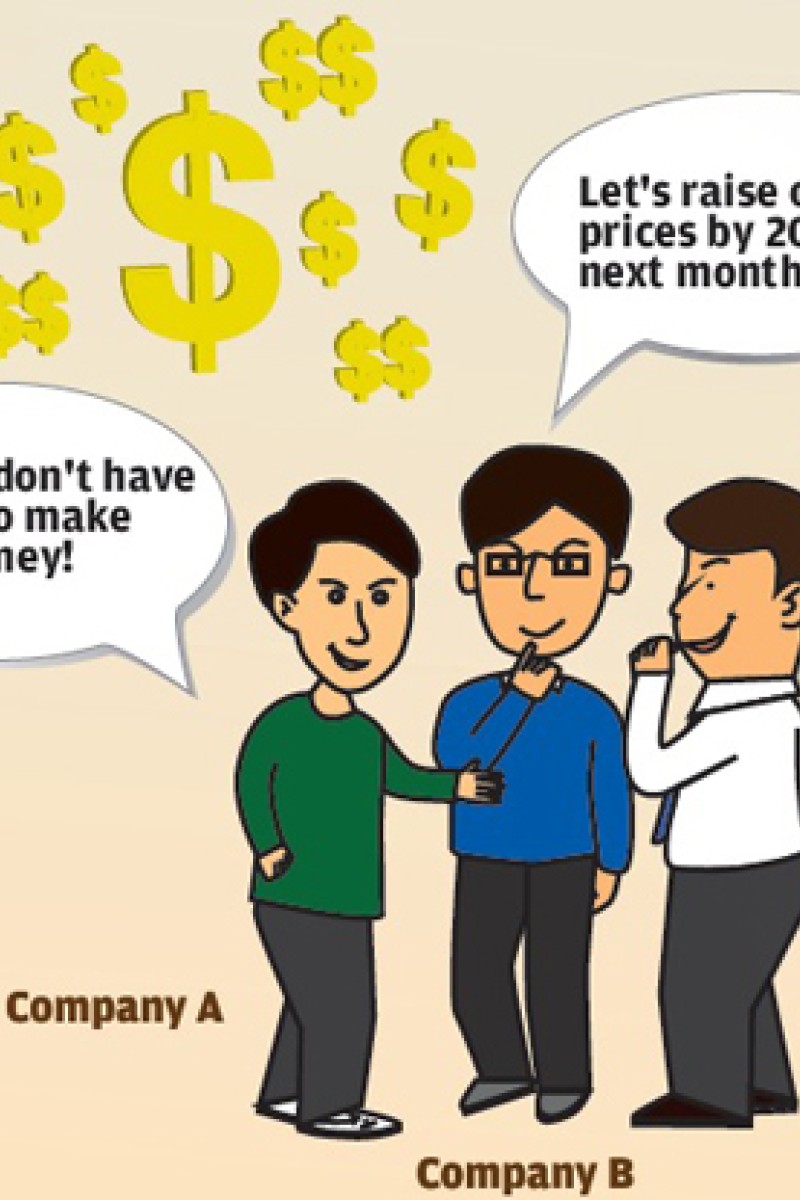
Consumers bear the brunt when businesses collude to fix prices

Price is one of the essential factors considered by consumers, along with quality, when they make a decision to purchase a product or service. Consumers benefit in an open and fair market where businesses compete by offering the best possible prices. Competition is undermined when competing businesses collude to fix prices.
What is price fixing?
Under the Competition Ordinance, price fixing is an illegal practice in which competitors agree to fix prices instead of making independent pricing decisions. Competitors may directly agree on a specified price, or they may agree on a formula to calculate prices or elements of price, including discounts, rebates, promotions or credit terms. Price fixing among businesses can be done verbally or in writing. As the agreed price is usually higher than the competitive price, consumers suffer.
Sometimes price-fixing can be achieved via a trade association or professional body. For instance, an association may issue recommendations on prices and/or publish (possibly non-binding) fee scales for members.
Industry body’s suggested fees
Some of us may not realise that certain long-standing practices may in fact run the risk of breaching the Competition Ordinance. For instance, the Travel Industry Council of Hong Kong (TIC) used to provide recommendations on tour escort service fees as well as air ticketing service charges to its member agencies for many years which might facilitate price fixing.
To avoid contravening the Ordinance, TIC cancelled its recommendation on escort and ticketing service fees with effect from June and September 2015 respectively, shortly before the law came into full effect by end of that year. Individual travel agencies are now free to set the fees and consumers can compare the fees charged by different agencies before signing up for tours or tickets.
Modeling agencies collusion
In September 2016, some of the world’s top modeling agencies were convicted of colluding and price fixing by the French Competition Authority. These modeling agencies held meetings to discuss the drawing up, distribution and application of the union pricing schedules and charged uniform prices “recommended” by their trade union, Synam. The illegal price-fixing drove up the appearance fees for models, depriving customers of the opportunity for price comparison. Fair competition was undermined.
The Authority accused the agencies of distorting the basis for commercial negotiations and harming competition to the detriment of their clients. Almost 40 agencies were hit with a 2.4-million euro fine. Synam was also fined for drawing up and effectively enforcing its pricing guides leaving little room for negotiation.
Parallel pricing
However, competitors selling products at the same price is not necessarily evidence of price fixing. In markets where the product sold is the same or very similar (such as fuel, or vegetables in a wet market), competitors’ prices may be the same or very similar even in the absence of an anti-competitive agreement. For example, if you know that pricing a little higher than your competitor is likely to mean that you will lose a lot of customers and pricing below your competitor means that your competitor will quickly match your price, prices naturally tend to gravitate towards the same level. This is known as “parallel pricing” and does not require any arrangement between competitors.
Suspected price fixing behaviours should be reported to the Competition Commission but it is not the Commission’s role to monitor prices to ensure prices are “fair”. The Competition Ordinance does not seek to regulate prices but it serves to promote competitive markets to encourage businesses to innovate and offer better products at better prices. This benefits all players in the market and the consumers ultimately.
Did you know?
Anti-competitive conduct of particular firms is not the only cause of insufficient competition in a market. Sometimes it may be due to certain structural aspects of the market. One of the Competition Commission’s functions is to conduct studies into the state of competition in markets in Hong Kong and make recommendations on how to improve competition in such markets if it is found to be lacking. The Commission also advises the Government on competition-related matters. Last year, the Commission published a report on its study into a segment of the residential building maintenance market and also issued a policy advice on the supply of liquefied petroleum gas to public rental housing estates. It is currently conducting a study into the auto-fuel market.
What happens abroad?
With the globalisation of business, it has become essential for competition agencies to cooperate with their overseas counterparts in the enforcement of their respective competition laws. Price fixing agreements may be made between large companies operating in different countries in relation to goods that are exported all over the world. International bodies like the International Competition Network provide a valuable platform for competition agencies to exchange ideas, facilitating their cooperation in the effective implementation of competition law.
Win a study trip to Singapore
Secondary four/ five students (or equivalent) and their teachers can now enter the “Don’t Cheat. Compete” Advocacy Contest by forming teams to create stories that illustrate the benefits of competition law. The top three winning teams will go on a study tour to Singapore.
Act fast, registration ends on April 13, 2017.